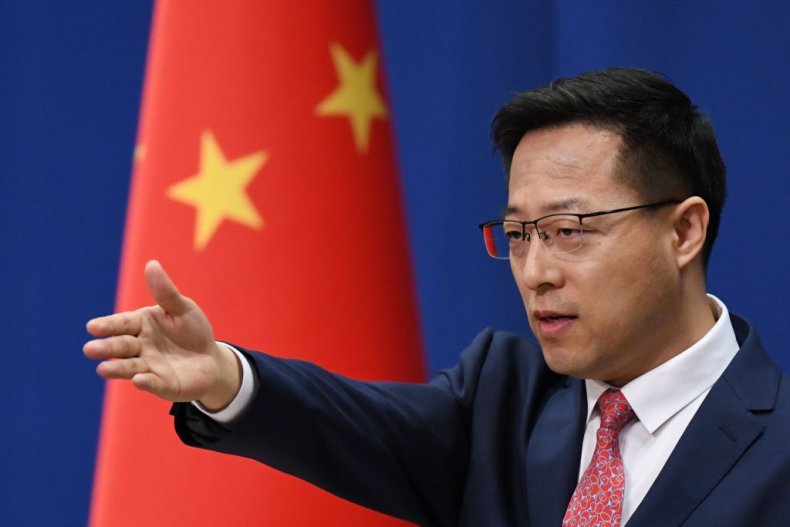China has refused to apologize after a diplomat in its foreign ministry tweeted a Photoshopped image depicting an Australian soldier killing an Afghan child.
Ministry spokesperson Zhao Lijian pinned the viral tweet after its publication on Monday. It remains live on Twitter with more than 45,000 likes despite an admission from the artist himself that the illustration was "not factual."
Beijing doubled down on its position later the same day when foreign ministry spokesperson Hua Chunying rejected Australian Prime Minister Scott Morrison's call for an apology.
"You cited the Australian side's words that the Chinese government should be ashamed. Shouldn't the Australian government feel ashamed that some of its soldiers on official duty in Afghanistan committed such cruelties?" Hua told a Bloomberg reporter, according to a read-out on the Chinese foreign ministry's website.
Shocked by murder of Afghan civilians & prisoners by Australian soldiers. We strongly condemn such acts, &call for holding them accountable. pic.twitter.com/GYOaucoL5D
— Lijian Zhao 赵立坚 (@zlj517) November 30, 2020
The controversial image, which shows a smiling Australian soldier covering a young Afghan goatherd's face with an Australian flag while slitting the child's throat, was "repugnant," Morrison said.
The doctored illustration is underscored by an English caption reading: "Don't be afraid, we are coming to bring you peace!"
Morrison described the Chinese diplomat's tweet as "deeply offensive to every Australian," adding that it "diminishes [China] in the world's eyes."
His government had contacted Twitter in a bid to have the post removed, he said.
Chinese state media publication Global Times, which operates under Communist Party newspaper People's Daily, has run a series of editorials defending the Beijing diplomat and criticizing Canberra for its reaction, in light of last month's damning report by the Australian military into crimes during the war in Afghanistan.
Australian special forces unlawfully killed 39 Afghan prisoners of war and civilians, including farmers, according to the Australian Defence Force report, the findings of which were made public. The ADF recommended further criminal inquiries into 19 members of the country's elite troops.
Among the recent articles on Global Times' social media pages is a 1,000-word essay by the image's creator, Wuhe Qilin, who admitted he made the picture in Photoshop.
The Beijing-based illustrator, who the newspaper had described previously as a "Wolf Warrior artist," also published critical works about the death of George Floyd and the wider Black Lives Matter protests in the United States.
Wuhe Qilin, whose real name is unknown, said he found it "hard to believe" that Prime Minister Morrison would take issue with his work, given the Australian military's recent report into alleged human rights abuses in Afghanistan.
"Of course, the elements and the scene depicted in the illustration were not factual," he wrote in the piece. "In reality, an Australian solder did not stand on an Australian flag and use it to cover the head of a young Afghan holding a lamb."
However, Wuhe Qilin insisted the illustration was created "based on facts." He said audiences should not focus on whether the image was real, but instead look at its content.
On Weibo, China's Twitter-like microblogging service where Wuhe Qilin has just over 700,000 followers, the artist posted images of Morrison's criticism on Monday and wrote: "I hear Morrison has some opinions about my illustration?"
He praised Chinese foreign ministry spokesperson Zhao for using his image, which was created on November 23, calling his tweet "mighty."
Cautious defense
On Tuesday, New Zealand's Prime Minister Jacinda Ardern backed Australia, calling the Chinese diplomat's tweet "not factually correct."
Ardern said she had "raised concerns with Chinese authorities" but stopped short of further condemnation of China, which is the largest trading partner of both New Zealand and Australia.
The row over Zhao's tweet comes amid rising economic tensions between Canberra and Beijing, which began with Australia's call for an independent investigation into the origins of the COVID-19 pandemic earlier this year.
The Chinese leadership has since taken punitive measures against Canberra, including all but banning coal imports and choking Australia's wine industry by raising tariffs up to 200 percent.
In recent months, Beijing has accused Australia and other western nations of following the lead of the U.S. in being tough on China—unfairly, it claims.
In separate op-eds this week, Global Times described the Australian prime minister as a "warhound of the U.S.," while calling China a "peace-loving country."
Since coming under attack by President Donald Trump over its handling of COVID-19 and its ongoing trade war with Washington, China has embraced social media platforms such as Twitter for its public diplomacy efforts, especially in its attempts to promote Chinese culture, despite its own citizens having no access to the website without the use of government-approved virtual private networks, or VPNs.
However, its recent sharp and aggressive stance on issues such as its policies in Xinjiang and Hong Kong, as well as its claim over the self-ruled island of Taiwan, has signaled a shift away from its soft power approach in favor of so-called "Wolf Warrior" diplomacy.
The phrase has origins in two nationalist movies titled Wolf Warrior and Wolf Warrior 2. It now describes a diplomatic style defined by confrontational rhetoric.

World - Latest - Google News
December 01, 2020 at 06:06PM
https://ift.tt/39rOwAO
China Not Sorry for Doctored Pic of Australian Soldier Killing Afghan Child - Newsweek
World - Latest - Google News
https://ift.tt/2SeTG7d
Bagikan Berita Ini














0 Response to "China Not Sorry for Doctored Pic of Australian Soldier Killing Afghan Child - Newsweek"
Post a Comment